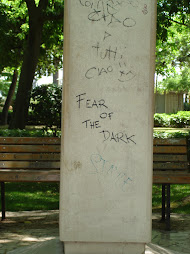Forgot to say, my own ms. of poems will be looking for a home soon. Here's a sample from AFTER THE CAVE,
Clearing
You decide things are a mess,
need clearing.
So you pull all of the pots and pans out
from the cabinet. And you look them over,
thinking,
which do I use the least?
So you can choose which ones
you’ll push way to the back,
in the dark, hard-to-reach place.
This assumes your shelves are fairly unmodern,
not the kind with baskets on casters
that roll out to make everything
available.
There’s something faintly sinful in the idea
of leaving nothing in the dark,
no quarter, no small corner to itself―
It sniffs of greed, you think,
to be so keen on access. So there they sit,
a cabinet’s worth of stainless steel, no-sticks, aluminum,
and maybe some oven-tempered glass
lids, a colander, a collapsible steamer
basket with one leaf missing,
like the first petal pulled off a daisy
(he loves me)―
And you’ve cleaned the shelves and laid in the new
liner, wishing the hardware store had offered
more colors than plain white and 1950’s black. And your knees
are sore because the cabinet’s beneath the counter,
and you had that moment when you knew what Sylvia
Plath had to do to kill herself by pushing her head
into her oven― the awkward kneeling, the climbing in,
squeezing yourself into that narrow, unlit space.
But then, you rocked back, your butt on your heels,
toes curled and flattened to bear your weight,
hands resting lightly on your thighs.
And your panoply of pots
sat like an audience at your back, waited for you to turn around
and see them. And you felt pretty good, felt lighter,
like Penelope after a night’s unweaving,
when she knew she’d bought another day
before she’d have to make her decision.
Monday, September 15, 2008
Subscribe to:
Post Comments (Atom)


2 comments:
This shall forever remain one of my favorite poems.
And great blog!!! Welcome to my world!
It's not Sylvia's oven I covet, but the dark empty cabinet. with the door pulled closed behind. Just for a while, just for a while ...
Such beautiful language. Thank you Miriam for this poem.
Post a Comment